-
 Bitcoin
Bitcoin $89,648.9936
3.10% -
 Ethereum
Ethereum $1,634.9935
0.83% -
 Tether USDt
Tether USDt $1.0001
0.00% -
 XRP
XRP $2.1121
0.22% -
 BNB
BNB $607.5525
1.13% -
 Solana
Solana $142.6148
3.47% -
 USDC
USDC $1.0001
0.01% -
 Dogecoin
Dogecoin $0.1661
3.19% -
 TRON
TRON $0.2448
1.39% -
 Cardano
Cardano $0.6440
0.74% -
 Chainlink
Chainlink $13.6009
1.53% -
 Avalanche
Avalanche $20.6094
0.82% -
 UNUS SED LEO
UNUS SED LEO $8.8353
-2.27% -
 Stellar
Stellar $0.2517
-1.99% -
 Sui
Sui $2.3807
6.54% -
 Shiba Inu
Shiba Inu $0.0...01288
2.64% -
 Hedera
Hedera $0.1748
3.14% -
 Toncoin
Toncoin $2.9376
-2.23% -
 Bitcoin Cash
Bitcoin Cash $347.8515
3.11% -
 Hyperliquid
Hyperliquid $18.5705
4.28% -
 Litecoin
Litecoin $80.3426
0.58% -
 Polkadot
Polkadot $3.8094
-2.11% -
 Dai
Dai $1.0000
0.00% -
 Bitget Token
Bitget Token $4.4853
1.04% -
 Ethena USDe
Ethena USDe $0.9992
0.00% -
 Pi
Pi $0.6384
0.98% -
 Monero
Monero $217.3786
0.45% -
 Pepe
Pepe $0.0...08251
4.70% -
 Uniswap
Uniswap $5.4544
0.75% -
 Aptos
Aptos $5.0198
-2.62%
What are the investor protection measures of an Ethereum ETF?
Ethereum ETFs benefit from a comprehensive investor protection framework, including SEC oversight, transaction transparency, secure custody, market surveillance, and investor education, ensuring accountability and mitigating risks for participants.
Feb 17, 2025 at 10:24 pm

Key Points of Ethereum ETF Investor Protection Measures
- Regulatory Framework
- Transaction Transparency
- Custody and Storage
- Market Surveillance
- Investor Education
Comprehensive Overview of Ethereum ETF Investor Protection Measures
1. Regulatory Framework
SEC Oversight: Ethereum ETFs, like other ETFs, are subject to oversight by the U.S. Securities and Exchange Commission (SEC). The SEC ensures that ETFs comply with all applicable regulations, including:
- Disclosure requirements, providing investors with accurate and timely information about the ETF's holdings, risks, and fees
- Restrictions on investments, limiting the types of assets that ETFs can hold to protect investors from undue risk
- Market manipulation rules, preventing unethical practices that could harm investors
Compliance with Exchange Rules: Ethereum ETFs are also listed on exchanges that have their own rules and regulations designed to protect investors. These rules may include:
- Listing requirements, ensuring that ETFs meet certain criteria before they can be traded on an exchange
- Trading restrictions, such as limits on short selling or restrictions on trading during volatile market conditions
- Market monitoring, allowing exchanges to detect and address potential violations of their rules
2. Transaction Transparency
- Real-Time Reporting: Ethereum ETF transactions are typically reported to a central depository in real time. This provides transparency to investors about the trading activity in an ETF and enables regulators to monitor trading patterns for potential irregularities.
- Audit Trails: Detailed records of all transactions are maintained, allowing regulators and auditors to track the movement of Ethereum tokens in and out of an ETF. This helps detect any unauthorized activity or fraud.
3. Custody and Storage
- Third-Party Safekeeping: The Ethereum tokens held by an ETF are typically stored with a qualified custodian. This custodian may be a bank or specialized cryptocurrency custodian who is responsible for safeguarding the tokens and ensuring they are not accessible to unauthorized individuals.
- Security Protocols: Custodians employ robust security measures, such as offline storage, encryption, and access controls, to protect Ethereum tokens from theft, loss, or unauthorized access.
4. Market Surveillance
- Automated Systems: Exchanges and regulators use automated systems to monitor trading activity in Ethereum ETFs for unusual patterns. These systems can detect suspicious activity, such as excessive volatility or large buy or sell orders, which could indicate potential market manipulation or other violations.
- Human Monitoring: Regulators also conduct manual reviews of trading activity to identify any potential issues that automated systems may miss. This can involve analyzing data, reviewing trading records, and conducting interviews with market participants.
5. Investor Education
- Disclosure Documents: Ethereum ETFs provide investors with comprehensive disclosure documents that explain the ETF's objectives, risks, and fees. These documents help investors make informed decisions about whether an Ethereum ETF is suitable for their investment portfolio.
- Investor Education Programs: Some exchanges and ETF issuers offer educational programs to help investors understand how Ethereum ETFs work and how to invest in them. These programs may include webinars, online resources, and investor guides.
FAQs
Q: What is the role of third-party custodians in protecting Ethereum in ETFs?
A: Third-party custodians hold and safeguard the Ethereum tokens held by an ETF, providing an additional layer of security to protect investors' assets from theft or unauthorized access.
Q: How do automated systems help protect investors in Ethereum ETFs?
A: Automated systems monitor trading activity in Ethereum ETFs for suspicious patterns that could indicate potential market manipulation or other violations. This helps regulators detect and address potential issues promptly.
Q: What information is included in the disclosure documents for Ethereum ETFs?
A: Disclosure documents for Ethereum ETFs provide investors with comprehensive information about the ETF's objectives, risks, fees, and investment strategies.
Q: Are Ethereum ETFs safe for retail investors?
A: While Ethereum ETFs generally offer some level of investor protection through regulatory oversight and other measures, it is important for retail investors to carefully consider the risks and do their own research before investing in any Ethereum ETF.
Disclaimer:info@kdj.com
The information provided is not trading advice. kdj.com does not assume any responsibility for any investments made based on the information provided in this article. Cryptocurrencies are highly volatile and it is highly recommended that you invest with caution after thorough research!
If you believe that the content used on this website infringes your copyright, please contact us immediately (info@kdj.com) and we will delete it promptly.
- From a Coin That Wasn't Supposed to Exist to Another That Got Melted Down
- 2025-04-22 21:00:12
- 3 Cryptos to Buy Now Before Parabolic Gains Hit
- 2025-04-22 21:00:12
- Coinbase Derivatives launches XRP-Future contracts, approved by the American Commodity Futures Trading Commission (CFTC)
- 2025-04-22 20:55:13
- Amp (AMP) price prediction: Can this token continue its bullish run?
- 2025-04-22 20:55:13
- Trump Establishes a Limited Bitcoin Strategic Reserve via Executive Order
- 2025-04-22 20:50:12
- Meme Coin Did Not Ruin This Cycle, But Instead Accelerated the Maturity of the Industry as a Market Catalyst
- 2025-04-22 20:50:12
Related knowledge
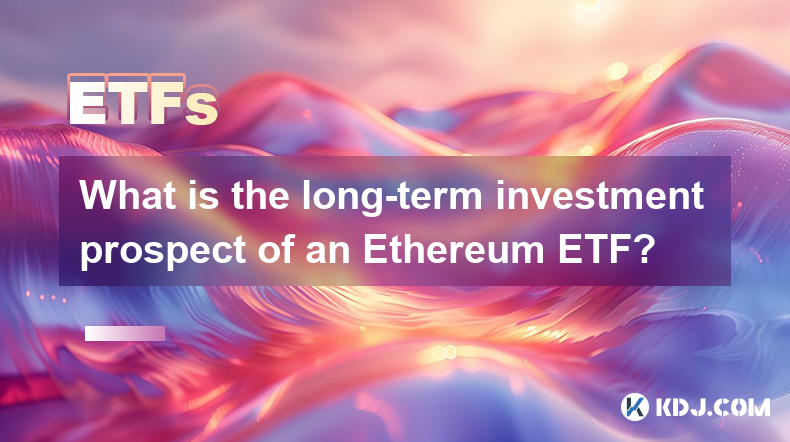
What is the long-term investment prospect of an Ethereum ETF?
Mar 18,2025 at 03:01pm
Key Points:Uncertainty surrounds the long-term prospects of an Ethereum ETF due to regulatory hurdles and market volatility.Approval hinges on regulatory clarity regarding cryptocurrencies, especially concerning investor protection and market manipulation.Successful ETF launches could boost Ethereum's price and adoption, but failure could negatively imp...
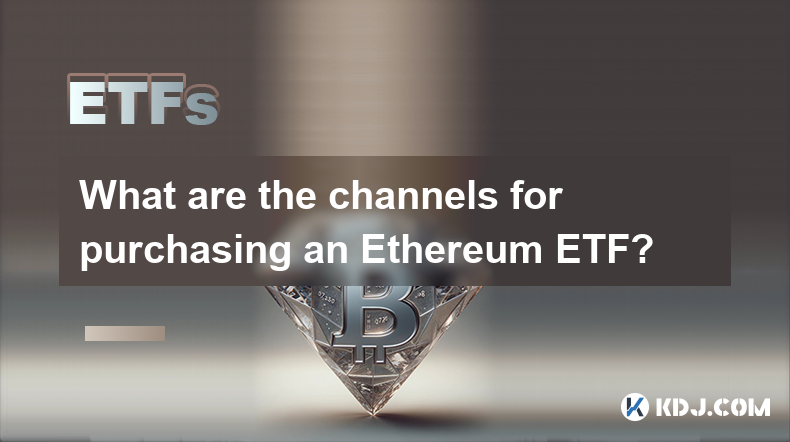
What are the channels for purchasing an Ethereum ETF?
Mar 18,2025 at 01:49am
Key Points:Currently, there are no Ethereum ETFs available for direct purchase by the general public in most major markets.Access to Ethereum exposure through ETFs is limited, mainly through futures-based ETFs.Purchasing Ethereum directly or through other investment vehicles remains a viable alternative.Regulatory hurdles and market complexities signifi...
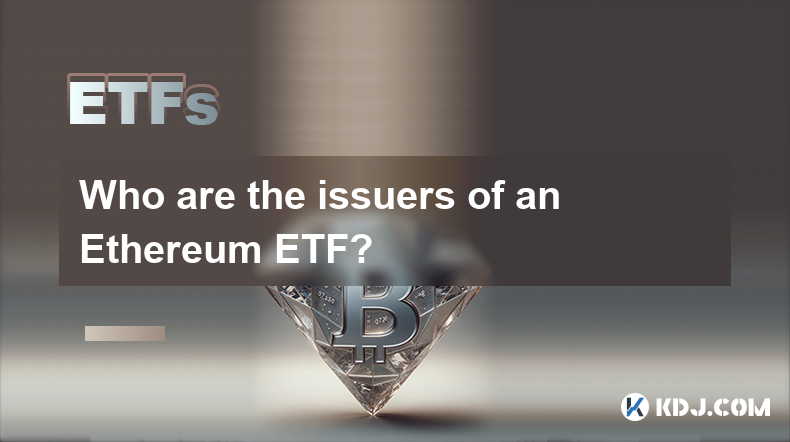
Who are the issuers of an Ethereum ETF?
Mar 19,2025 at 08:07pm
Key Points:There are no currently approved Ethereum ETFs in the US, meaning no single issuer can be definitively named. However, several firms have filed applications.The issuers of potential Ethereum ETFs will be large, established financial institutions, typically asset management companies.The specific requirements for ETF issuers are stringent and o...
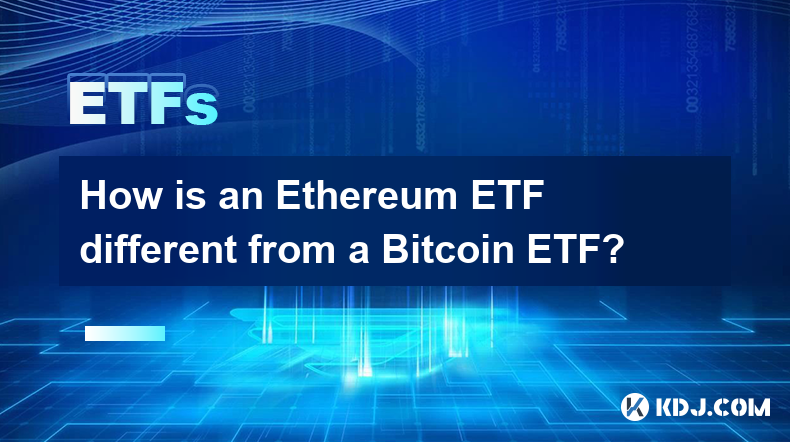
How is an Ethereum ETF different from a Bitcoin ETF?
Mar 17,2025 at 10:55am
Key Points:Underlying Asset: The core difference lies in the underlying asset: an Ethereum ETF tracks the price of Ether (ETH), while a Bitcoin ETF tracks the price of Bitcoin (BTC).Technology and Use Cases: Ethereum's blockchain supports smart contracts and decentralized applications (dApps), creating a distinct technological and investment narrative c...
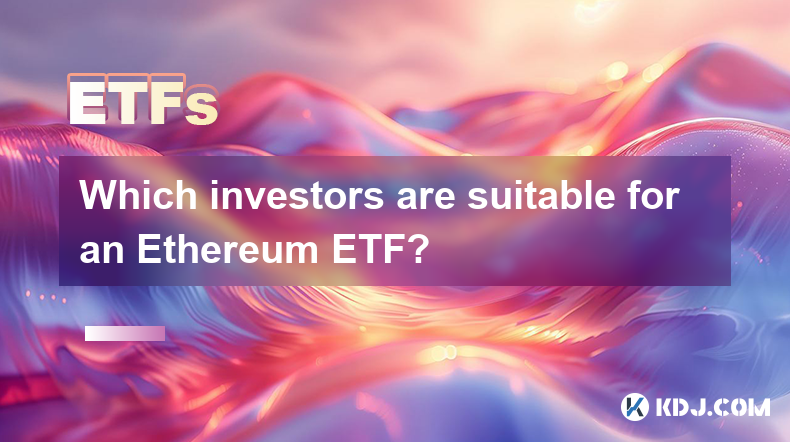
Which investors are suitable for an Ethereum ETF?
Mar 16,2025 at 05:50pm
Key Points:Risk Tolerance: Ethereum ETF investment requires a high risk tolerance due to the volatility of the cryptocurrency market.Investment Goals: Investors seeking long-term growth potential and exposure to the Ethereum ecosystem are suitable candidates.Investment Horizon: A longer-term investment horizon is crucial to weather market fluctuations.U...
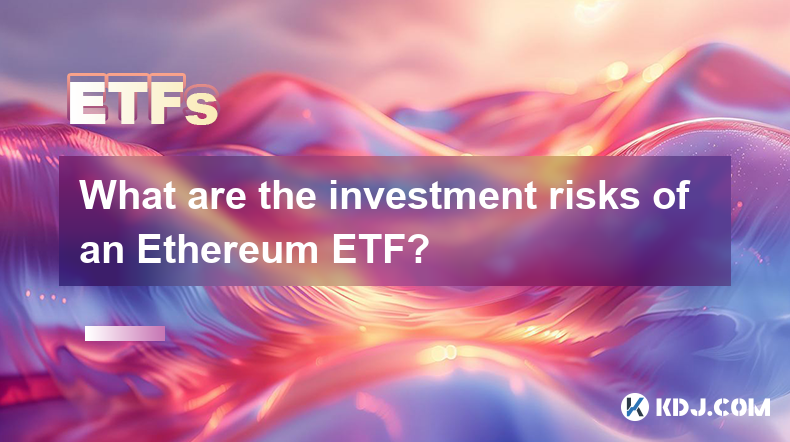
What are the investment risks of an Ethereum ETF?
Mar 18,2025 at 02:12am
Key Points:Price Volatility: Ethereum's price is highly volatile, impacting ETF share prices.Regulatory Uncertainty: Changes in regulatory landscapes can significantly affect ETF trading and performance.Market Manipulation: The potential for market manipulation, particularly in smaller ETFs, exists.Underlying Asset Risk: Risks associated with the Ethere...

What is the long-term investment prospect of an Ethereum ETF?
Mar 18,2025 at 03:01pm
Key Points:Uncertainty surrounds the long-term prospects of an Ethereum ETF due to regulatory hurdles and market volatility.Approval hinges on regulatory clarity regarding cryptocurrencies, especially concerning investor protection and market manipulation.Successful ETF launches could boost Ethereum's price and adoption, but failure could negatively imp...

What are the channels for purchasing an Ethereum ETF?
Mar 18,2025 at 01:49am
Key Points:Currently, there are no Ethereum ETFs available for direct purchase by the general public in most major markets.Access to Ethereum exposure through ETFs is limited, mainly through futures-based ETFs.Purchasing Ethereum directly or through other investment vehicles remains a viable alternative.Regulatory hurdles and market complexities signifi...

Who are the issuers of an Ethereum ETF?
Mar 19,2025 at 08:07pm
Key Points:There are no currently approved Ethereum ETFs in the US, meaning no single issuer can be definitively named. However, several firms have filed applications.The issuers of potential Ethereum ETFs will be large, established financial institutions, typically asset management companies.The specific requirements for ETF issuers are stringent and o...

How is an Ethereum ETF different from a Bitcoin ETF?
Mar 17,2025 at 10:55am
Key Points:Underlying Asset: The core difference lies in the underlying asset: an Ethereum ETF tracks the price of Ether (ETH), while a Bitcoin ETF tracks the price of Bitcoin (BTC).Technology and Use Cases: Ethereum's blockchain supports smart contracts and decentralized applications (dApps), creating a distinct technological and investment narrative c...

Which investors are suitable for an Ethereum ETF?
Mar 16,2025 at 05:50pm
Key Points:Risk Tolerance: Ethereum ETF investment requires a high risk tolerance due to the volatility of the cryptocurrency market.Investment Goals: Investors seeking long-term growth potential and exposure to the Ethereum ecosystem are suitable candidates.Investment Horizon: A longer-term investment horizon is crucial to weather market fluctuations.U...

What are the investment risks of an Ethereum ETF?
Mar 18,2025 at 02:12am
Key Points:Price Volatility: Ethereum's price is highly volatile, impacting ETF share prices.Regulatory Uncertainty: Changes in regulatory landscapes can significantly affect ETF trading and performance.Market Manipulation: The potential for market manipulation, particularly in smaller ETFs, exists.Underlying Asset Risk: Risks associated with the Ethere...
See all articles























































































